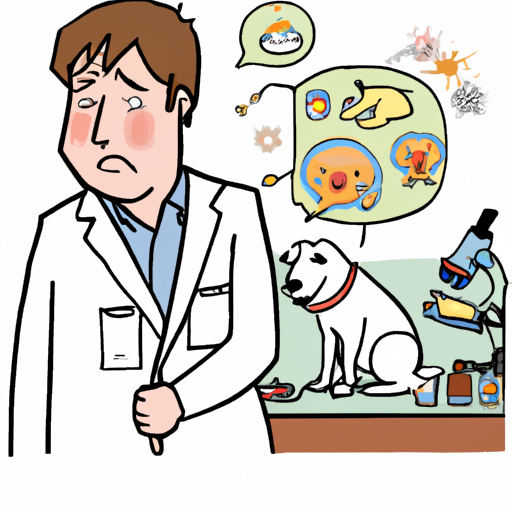Understanding Giardia
As a responsible pet parent, it’s essential to understand what you’re dealing with. Giardia is a microscopic parasite that infects the intestines of dogs, leading to uncomfortable symptoms such as vomiting, diarrhea, and weight loss. It’s a fairly common illness, especially in young or immunocompromised dogs. The parasite is passed through fecal matter and can survive in the environment for several months, hiding in places like contaminated water or soil.
Recognizing the Symptoms
If you suspect your furry friend might have giardia, you’ll want to keep an eye out for certain symptoms. These can include:
- Frequent diarrhea
- Weight loss
- Lack of appetite
- Vomiting
- General lethargy
Remember, these symptoms can also be signs of other illnesses, so it’s crucial to get a proper diagnosis from your vet.
Diagnosis and Treatment
Your vet will diagnose giardia through a fecal exam, and treatment typically involves a course of antibiotics. Here’s what to expect:
- Fecal Exam: Your vet will take a stool sample to examine for the presence of giardia. It might take a few samples to confirm, as giardia can be difficult to detect.
- Antibiotic Treatment: If giardia is confirmed, your vet will likely prescribe a course of antibiotics. It’s critical to complete the full course, even if your dog’s symptoms seem to improve.
- Follow-Up Exam: After treatment, your vet will want to perform another fecal exam to ensure the giardia has been eliminated.
| Step | Action |
|---|---|
| 1 | Fecal Exam |
| 2 | Antibiotic Treatment |
| 3 | Follow-Up Exam |
Preventing Re-Infection
After your dog has been treated for giardia, you’ll want to take steps to prevent re-infection. This involves:
- Regularly cleaning and disinfecting your dog’s living areas, including their bed, toys, and food/water bowls.
- Avoiding areas where your dog could come into contact with contaminated water or soil.
- Regular hand washing to prevent transmission from you to your dog.
Supporting Your Dog’s Recovery
Throughout this ordeal, it’s important to provide emotional support for your dog. They might be feeling unwell and anxious, so extra cuddles and gentle reassurances can go a long way.
Also, remember to keep them hydrated and provide a balanced diet to help their body fight off the infection and recover.
Frequently Asked Questions
Q: Can humans get giardia from dogs?
A: Yes, it’s possible, but it’s relatively rare. Always wash your hands after handling your dog’s waste.
Q: How long does giardia last in dogs?
A: With proper treatment, most dogs recover in 1-2 weeks. However, it can sometimes take longer.
Q: Can I prevent my dog from getting giardia?
A: While it’s impossible to completely prevent giardia, regular hygiene and avoiding contaminated areas can reduce the risk.
Remember, you’re not alone in this journey. Lean on the expertise of your vet and the support of your pet community. Together, you can help your beloved canine companion get back to their happy, tail-wagging self.



